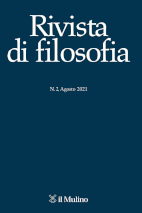[:en]
 Special Issue of Rivista di Filosofia on Decision, uncertainty, and the history of philosophy
Special Issue of Rivista di Filosofia on Decision, uncertainty, and the history of philosophy
Editors: Vincenzo Crupi and Malvina Ongaro
From the perspective of intellectual history, decision theory is a very recent discipline. While having some notable antecedents, its main developments come from the Twentieth Century. Since then, theories about rational decision-making have had an enormous impact on economics, psychology, and philosophy.
Even though concepts like decision and uncertainty may have a short philosophical lineage, reflections on them can be found throughout the history of Western philosophy. In Protagoras, Plato claims that wisdom can be sufficient for virtue, if it takes into full account future sensations – in contemporary terms, this would support a utility calculus with no discount rates for the future. Framed in this way, Plato’s view can enter into modern debates about inter-temporal decisions and biases, just as these debates can help the scholar who wants to understand classical ideas about wisdom and virtue. More recently, political philosophy has provided important material for decision theorists. Nineteenth Century utilitarianism has found new arguments in Harsanyi’s and Broome’s formalisations, and social contract approaches to society have been revived and enriched with game-theoretical models. Finally, a famous example of the type of contribution that historians can find in decision theory is provided by Hacking’s (1972) influential formalisation of Pascals’s wager on the opportunity to believe in God.
Scattered as they may be, examples like these show how a historical perspective could provide important insights on decision-making to our modern theorising, just as formal clarity and the interdisciplinary tools of decision theory can deepen our understanding of crucial aspects in the history of thought. And yet, the dialogue between these two traditions – decision theory and history of philosophy – has been no more than casual so far. This call for papers is intended as a first step to bridge this gap and allow decision theorists to re-discover historical reflections on decision, while providing historians with new instruments to interpret classical debates.
Selected contributions will appear in a dedicated section in Rivista di filosofia, one of the oldest Italian philosophical journals (founded 1909). In addition to theoretically-oriented studies and investigations, with particular attention to analytic philosophy, Rivista di filosofia offers reflections and documentation about the status of philosophy and its relations to scientific thought, its history and institutions, and its methodologies.
Submissions: Manuscripts to be submitted should be sent to: malvina.ongaro@uniupo.it
DEADLINE: 30 March 2022
Link to the call on the journal website: https://www.mulino.
[:it] Special Issue of Rivista di Filosofia on Decision, uncertainty, and the history of philosophy
Special Issue of Rivista di Filosofia on Decision, uncertainty, and the history of philosophy
Editors: Vincenzo Crupi and Malvina Ongaro
From the perspective of intellectual history, decision theory is a very recent discipline. While having some notable antecedents, its main developments come from the Twentieth Century. Since then, theories about rational decision-making have had an enormous impact on economics, psychology, and philosophy.
Even though concepts like decision and uncertainty may have a short philosophical lineage, reflections on them can be found throughout the history of Western philosophy. In Protagoras, Plato claims that wisdom can be sufficient for virtue, if it takes into full account future sensations – in contemporary terms, this would support a utility calculus with no discount rates for the future. Framed in this way, Plato’s view can enter into modern debates about inter-temporal decisions and biases, just as these debates can help the scholar who wants to understand classical ideas about wisdom and virtue. More recently, political philosophy has provided important material for decision theorists. Nineteenth Century utilitarianism has found new arguments in Harsanyi’s and Broome’s formalisations, and social contract approaches to society have been revived and enriched with game-theoretical models. Finally, a famous example of the type of contribution that historians can find in decision theory is provided by Hacking’s (1972) influential formalisation of Pascals’s wager on the opportunity to believe in God.
Scattered as they may be, examples like these show how a historical perspective could provide important insights on decision-making to our modern theorising, just as formal clarity and the interdisciplinary tools of decision theory can deepen our understanding of crucial aspects in the history of thought. And yet, the dialogue between these two traditions – decision theory and history of philosophy – has been no more than casual so far. This call for papers is intended as a first step to bridge this gap and allow decision theorists to re-discover historical reflections on decision, while providing historians with new instruments to interpret classical debates.
Selected contributions will appear in a dedicated section in Rivista di filosofia, one of the oldest Italian philosophical journals (founded 1909). In addition to theoretically-oriented studies and investigations, with particular attention to analytic philosophy, Rivista di filosofia offers reflections and documentation about the status of philosophy and its relations to scientific thought, its history and institutions, and its methodologies.
Submissions: Manuscripts to be submitted should be sent to: malvina.ongaro@uniupo.it
DEADLINE: 30 March 2022
Link to the call on the journal website: https://www.mulino.
[:]
